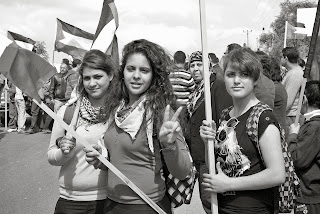
Call for papers
FE journal -journal of the Centre for Women’s Studies, Ankara University
Two years ago, fe journal editorial board member Assoc. Prof. Elifhan Köse from Karaman was prosecuted for attending a protest. This was part of a marginalization story in her department. Most of us thought this was a story about being a female academic in the provincial universities. However, it turns out now that it wasn’t. Other editorial board members like Prof. Funda Şenol Cantek and Nisan Kuyucu have now been expelled from their university posts due to signing a notice by Academics for Peace (Barış için Akademisyenler (BAK)). Two of our founders, Prof. Gülay Toksöz and Prof. Alev Özkazanç had to retire due to the same reason and despite their will to continue academic research. Others from the same group are awaiting. Thus this crisis was not limited to Karaman and it may not be limited to Turkey. In these difficult days, it seems unnecessary to talk about things other than the emergencies. Yet talking about freedom of expression is perhaps even more necessary than ever, with all its aspects including what is urgent and who decides what is urgent… Thus, for our December 2017 issue, we decided to include feminist analysis/insights on freedom of expression.
At times where we walk on the hopeless edges of the academia, questions that demand self-criticism, such as “How will resistance which will include feminisms rather than excluding them be shaped or how is it shaped?”, “How do feminist academic works return back to us?”, “How do social and political effects of praxis against discrimination work and at which points do they backlash?” circle in our heads.
And, so we remember some examples like Halide Edip and Hannah Arendt. How did these writers acquire their literary and/or philosophical voices sometimes right at the moment of expression – in crisis? How do these writers develop their expression against inner and outer obstacles, situated right at the face of new freedoms of expression? Is a will to resist and know while growing a heart without creating enemies, and insist on the truth possible?
Where do feminist and LGBTQ tools and practices of knowledge and communication stand in the crisis of expression? What about feminist academic and non academic journals? Blogs?
What are international, national and/or transnational feminist tools/ instruments /practices of struggle that can act against the contemporary crisis of expression in Turkey? Does feminist civil society have any duties? How far have we fulfilled these duties? How far along shall we go?
Is a feminist academy outside the university possible?
How are labor relations shaped during the crisis of expression? What are experiences, insights and feminist coping strategies of struggle?
For this special issue, we are not only expecting papers from law and political sciences but also from humanities, cinema, journalism, theater etc. Please send us support with your ideas and analysis!
Our web address: federgi.com (we are indexed by genderwatch and ebsco)
Latest date for sending articles is October, 2017.
Send it to: fejournal@gmail.com, word limit: 3500-7500.



